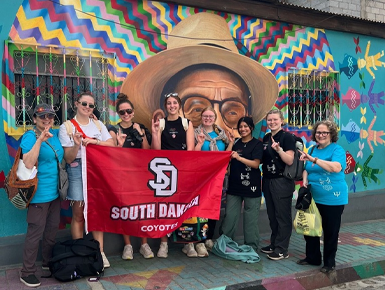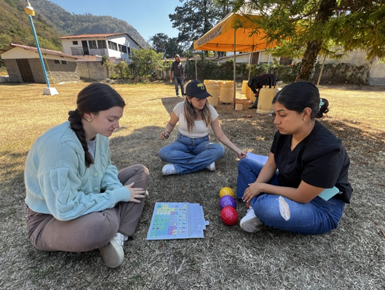Interdisciplinary Clinical Outreach Trip Changes Lives for USD Students
Those who made the journey were students Ally Langsdorf, communication sciences and disorders major; Anna Kimbell, communication sciences and disorders major; Lauren Duhn, health sciences major; Jillian Van Diepen, dental hygiene major; and Alayna Wingate, dental hygiene major.
The goal? To support the Indigenous Mayan community and children with developmental disabilities by providing health care resources.
Their destination? Santiago Atitlán, Guatemala.
The group was chaperoned by Elizabeth Hanson, Ph.D., associate professor in the Department of Communication Sciences & Disorders in the College of Arts & Sciences; Laura Ball, Ph.D., former adjunct faculty member; and USD alumna Imogen Prellwitz-Aude ’24.
“The purpose of these trips is to broaden the students' perspectives and help them foster an understanding of cultures and communities, as well as to gain a deeper appreciation of the differences in health care and education for the Indigenous people in Guatemala,” said Hanson.
Hanson, along with the USD Department of Physical Therapy and the Department of Occupational Therapy, developed this trip as part of one of the university’s faculty-led programs (FLP). FLPs allow students to take a course while traveling domestically or abroad for one to two weeks, with other students and faculty members. Three to six credits can be earned, depending on the program duration and course content.
Prior to this trip, this group met weekly for classes that covered Guatemalan history, health care, languages and culture. Other topics discussed included trip logistics, such as passport obtainment, currency exchange and safety.
Following trip preparation, the group arrived in Santiago Atitlán, equipped with knowledge and a shared sense of purpose. Each day presented students with opportunities to connect with the community, apply their knowledge and see firsthand the realities of health care in Guatemala.
Making a Difference Through Service
Van Diepen and Wingate traveled to local grade schools, teaching children proper oral hygiene techniques and applying fluoride treatments.
“We gave out toothbrushes, toothpaste and floss. Everyone was so kind and happy to see us,” said Van Diepen. “They loved that we were there to help them. The children were amazing, and seeing their smiles after we gave them dental resources was incredibly heartwarming.”
Langsdorf, Kimbell and Duhn worked closely with ADISA, a Guatemalan organization focused on supporting local children and adults with developmental disabilities and their families.
They helped evaluate communication needs and introduced assistive tools like the GoTalk9+ device, courtesy of the Attainment Company in Verona, Wisconsin, to help nonverbal children express themselves. The group worked with the families of these children to provide training and resources to encourage continued use of the communication device at home.
For the students, seeing firsthand how these resources could change a child's daily life was a powerful reminder of the importance of their future profession.
“Working with ADISA and the local schools affirmed a lot of what I have been learning in the classroom,” said Kimball. “Seeing kids with different disabilities gave me more insight into what being a speech-language pathologist is like.”
That insight continued with Langsdorf, who said that interacting with the children was another defining moment of the trip.
“The most monumental moment for me was when this little girl with Down syndrome, who was minimally verbal, saw and began using the playground augmentative and alternative communication (AAC) board we brought with us,” said Langsdorf. “She saw it and, without prompts, used it to communicate with us. She told us what she wanted, answered yes/no questions and even made some jokes. Her eyes lit up when she realized we could understand her. It was an unforgettable moment.”
A Life-Changing Experience
Each day, the group retreated to a quiet place to reflect on what they saw, ask questions and share their insights. These conversations often brought moments of connection, whether about the people they met, challenges they may have faced or the ways they saw their future careers taking shape.
Looking back, the students unanimously described it as one of the most impactful and rewarding trips they’ve been on.
“Our group of students and professors became so close. The trip was the best I’ve ever been on, and it exceeded my expectations,” said Langsdorf. “I had the most amazing week working with the kids in the clinic and learning about my future career.”
Van Diepen agreed and encouraged other students to take part in trips like these.
“I enjoyed being immersed in their culture and participating in their activities,” she said. “I would tell future Coyotes to do this 100%. It will be like nothing you’ve ever done before. The joy you will bring the people you serve is worth it.”
For Kimbell, the trip held an even deeper meaning as she was adopted from Guatemala at 16 months old. In the weeks before the university trip, her family traveled there with her to help her reconnect with her roots.
“It was incredible. I fell in love with my country. I loved the idea of giving back to the people where I’m from, with the education and knowledge I’ve obtained, paired with my passion for speech and language,” said Kimbell.
When the trip concluded, the students turned in written and recorded reflections of their experience as an evidence-based teaching tool that helps them process and integrate new information and events.
“Overall, the student response to this trip was positive. They were exposed to some extreme situations and conditions, but were open-minded and sympathetic,” said Hanson. “They were not afraid to jump in and interact; they were energized.”
In the future, Hanson hopes to maintain a reciprocal partnership with ADISA —one that not only offers students meaningful, hands-on learning but continues to meet real needs in the Santiago Atitlán community.
The impact of the trip, she believes, extends far beyond academic credit by shaping their professional readiness.
“Students who take part in trips like this gain valuable exposure that prepares them for work in any environment,” said Hanson. “Their commitment to learning, serving others and embracing new opportunities shapes them into compassionate leaders equipped to make a positive impact with skills that will serve them for a lifetime.”





